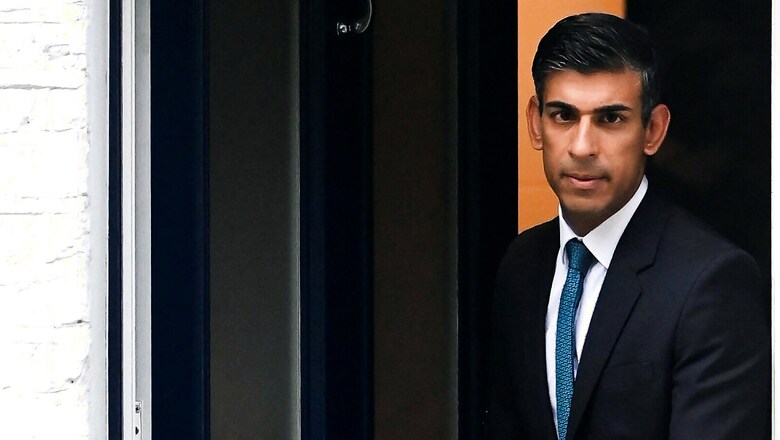
views
An Obama moment has arrived in Britain. By voting Barack Obama for the highest political post in the country, the American people had created history in 2008. With Rishi Sunak all set to become the Prime Minister of Britain, the British people deserve credit for creating a similar history in 2022.
Obama was a liberal and Sunak is a conservative, yet in democracies when a leader hails from a minority community, it goes to the glory of democratic credentials and mirrors social maturity of a country.
Obama inherited a recession-hit economy in the United States. Prime Minister Sunak is confronted with an inflation-hit economy. What British people want right now is a leader who can restore unity in a fractured ruling party and combat head-on the economic woes afflicting the country. The Tories have been rewarded by the voters with a huge number of seats in the Parliament, but there has been a leadership crisis in the party. Rishi Sunak is the third Prime Minister in a year and expectations are high that he can provide stable leadership, fix the grave economic crisis facing the country and also play a constructive role in an utterly divided world. Rishi has promised all those in his initial remarks after winning the leadership race.
The British Conservative Party members could have elected Rishi Sunak in an earlier round of voting after scandal-ridden Prime Minister Boris Johnson put in his papers. Rishi was the Chancellor of Exchequer who understood the economic predicament facing Britain and he was the right person who could have been chosen to lead the country to reduce inflation, ensure employment opportunities, repair and strengthen supply chains, conclude trade deals, including one with India and adopt strategies to deal with a persistent pandemic and its consequences.
Instead, majority of the members of the Conservative Party chose Liz Truss who championed neoliberal economic policies when the government intervention was urgently needed to combat forty-year high inflation, an energy crisis affecting every household, mounting unemployment, reduced value of Pound Sterling vis-à-vis US dollar and numerous other problems threatening the country.
Liz Truss was Foreign Secretary in the Johnson government, when she took a belligerent stand against Russian invasion of Ukraine, preached India not to buy Russian oil, backed the corporate sector promising huge tax cut, and expected trickle-down effect of her neoliberal economic policy at a time government intervention was imperative. When the IMF, the World Bank, scores of economists around the world were repeatedly warning of a deadly global recession, Truss trusted her economic sense. Her short-term budget was enough to frighten the investors and the strong market response was sufficient to finally force her to step down.
Her government could be in office for about six weeks and Liz Truss was thus showered with mountains of insults. The Conservative Party’s acute leadership crisis emboldened the Labour Party to demand fresh elections. The British media reported the discoloured image of British democracy mirrored in international reactions to the resignation of Liz Truss. Pundits of global politics had already been lamenting the slow collapse of the international liberal order, when dangers in the American and British political processes also came to be echoed in the 6 January insurrection backed by US President Donald Trump in early last year; and British Prime Minister Boris Johnson later violating his own rules and partying in the midst of the pandemic.
There are numbers of examples of powerful democracies disregarding international rules, while vociferously championing the rules-based liberal international order. But when Presidents and Prime Ministers of the United States and Britain, two mature and powerful democracies, do not abide by their respective domestic laws, credibility of democratic governing systems takes a severe beating. President Joe Biden promised to restore national unity after the failure of the January 6 insurrection in the Capitol Hill, but has not been able to do so far. In fact, when he called for a summit of democratic countries, questions were raised about the practice of democracy within the United States. Can Rishi Sunak deliver what he has promised?
Researchers and political analysts have been highlighting the dangers of democracy, some of them have proclaimed death of democracy in certain parts of the world, and social media is replete with comments on relevance of democracy, while Vladimir Putin in Russia and Xi Jinping of China are perhaps boasting about their successes in sustaining domestic stability and tackling economic challenges. Putin has sustained his war in Ukraine for months, despite severe Western sanctions. The United States and its Western allies have not been able to fulfil their promise of crippling the Russian economy. Despite a real estate debt crisis, a banking crisis, popular discontent due to Zero-Covid policy and energy shortages, Xi Jinping ensured a third term for himself in China. In the so-called clash between autocracy and democracy, the champions of democracy appear to be on the losing side partly due to the crisis in their domestic democratic governance!
Francis Fukuyama, the noted American scholar, who became globally well known for his “End of History” proclamation, must have been revising his concept in the light of what’s happening in powerful democracies, including the US and Britain, and powerful autocracies, especially China and Russia.
It is evident that a large number of Conservative Party MPs in Britain supported Rishi Sunak and got him elected to run the administration amidst economic difficulties. But the fact remains that Boris Johnson did try to stage a comeback, and promptly ended his holiday and returned to London. He tried in vain to strike a deal with Sunak first, then sought unsuccessfully to persuade Penny Mordaunt to refrain from contesting and instead supporting him. The greed for power among even scandal-ridden leaders is actually one of the major snags of democratic polities. When Johnson failed in his efforts, he announced that he would not contest for maintaining party unity.
It would, of course, be hard for him to support a candidate whose resignation from the post of Chancellor of Exchequer under his leadership precipitated his fall. The most significant challenge to Prime Minister Sunak thus may come from Johnson himself and his supporters among the Conservative MPs in the British Parliament. People in Britain deserve a Prime Minister who can deliver, bring back stability, stabilise the economy, but political ambitions of aspiring leaders may make it hard for Sunak to implement his pronounced policy goals. Had it not been so, Liz Truss would not have been elected in the first place. Because it is so, it is not going to be a cake walk for Prime Minister Sunak.
For India, it would be important to watch whether Sunak can deliver on a free trade deal. Johnson supported the trade deal with India and so did Liz Truss, but both of them failed. Former Home Secretary Suella Braverman, who supports Sunak, apparently derailed the free trade negotiations by making an unpalatable statement on Indian immigrants. Indian democracy is politically stable, endowed with a strong leader in Prime Minister Narendra Modi, and economically performing better at the moment than inflation-hit Britain. If the Diwali deadline for the free trade agreement between Britain and India could not be met, will it be done on or before Holi?
At a broader level, Obama completed two terms in office, it is to be seen if Rishi Sunak can complete the current term of the Conservative Party in power.
The writer is editor, ‘Indian Foreign Affairs Journal’, founder and Honorary Chairperson of Kalinga Institute of Indo-Pacific Studies, and formerly professor of JNU. The views expressed in this article are those of the author and do not represent the stand of this publication.
Read all the Latest Opinions here
















Comments
0 comment